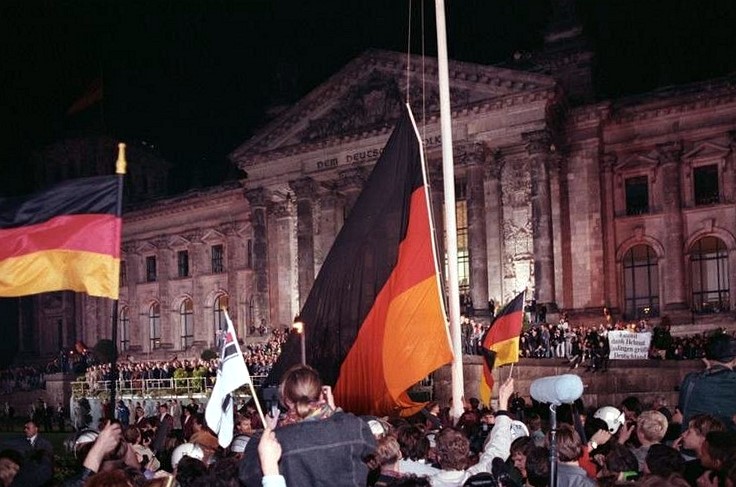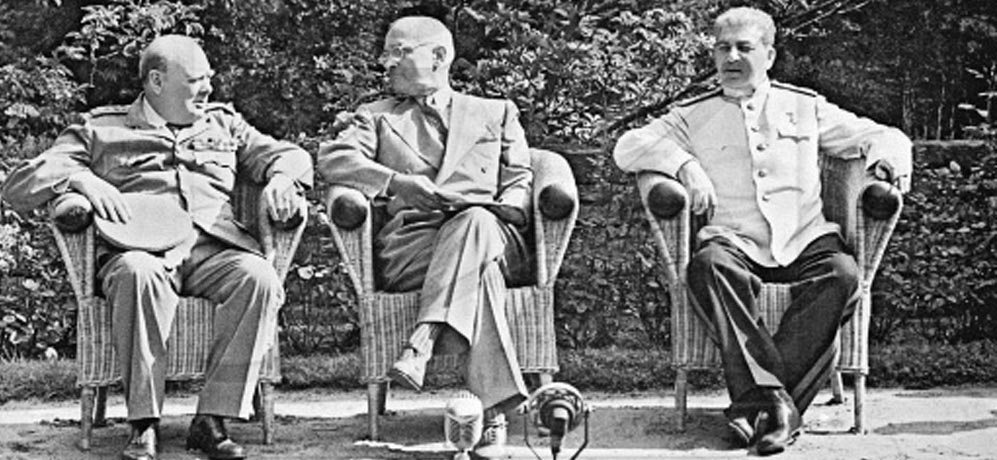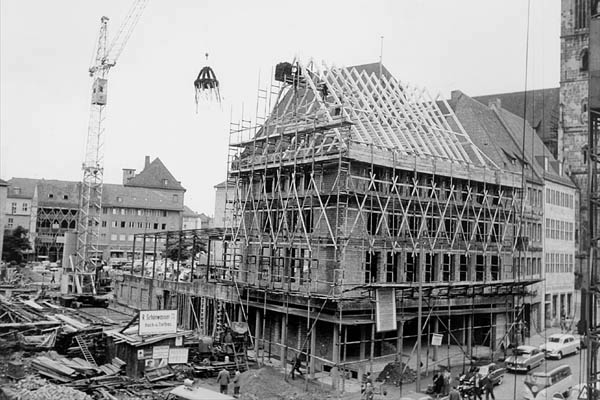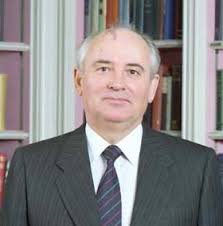
Mikhail Gorbachev was instrumental in the fall of the Berlin wall and the end of the cold war.
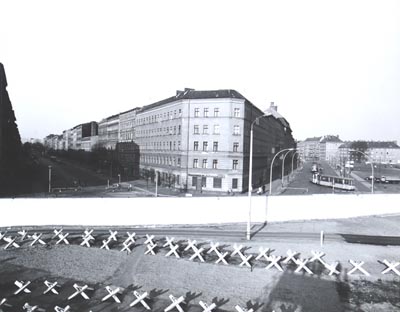
"The Anti Fascist Protection Barrier".
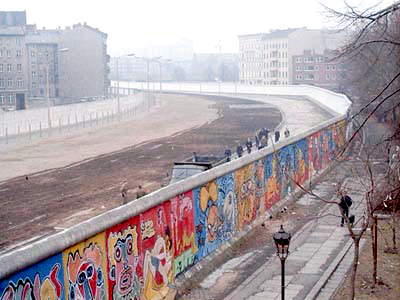
The Berlin wall was used as a canvas for many artists.
Detente
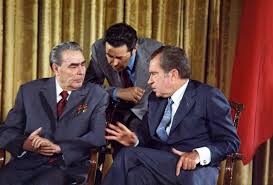 Détente is a term French meaning "release" or "lightening". In many historical texts it is translated as "strife". The term was used in international politics since early 1970. It is commonly applied to any international situation in which previously hostile nation not involved in a war lessen tensions through diplomacy and measures to build confidence. However, the term is primarily used to refer to the reduction of tension between the Soviet Union and the United States in the process of thawing of the Cold War which took place since the fall of the Nazi regime in the late 1940’s to the early 80’s . In Russia, the term is known as "razriadka" (разрядка, in Russian).
Détente is a term French meaning "release" or "lightening". In many historical texts it is translated as "strife". The term was used in international politics since early 1970. It is commonly applied to any international situation in which previously hostile nation not involved in a war lessen tensions through diplomacy and measures to build confidence. However, the term is primarily used to refer to the reduction of tension between the Soviet Union and the United States in the process of thawing of the Cold War which took place since the fall of the Nazi regime in the late 1940’s to the early 80’s . In Russia, the term is known as "razriadka" (разрядка, in Russian).Cold War Financial Strains
Both sides of the Cold War had important reasons to seek a reduction of stress. Leonid Brezhnev and other Soviet leadership felt that the economic burden of the nuclear arms race was unsustainable. The US economy was also in financial trouble because the Vietnam War drained government finances, while Lyndon Johnson tried to expand the welfare state. In Europe, the Ostpolitik of Willy Brandt decreased tensions; the Soviets hoped that with the Détente had a greater chance of trade with Western Europe. Soviet thinkers also felt that a less aggressive policy could potentially spread to Western Europe from its ally The US.
Raw relations with the People's Republic of China led to the Sino-Soviet break . This caused great concern in the USSR, the Moscow government feared a potential Chinese-American alliance against them and therefore believed improvement in relations with the United States was necessary. The trip to China by Richard Nixon had thawed American feelings towards communism.
There was also a parity in nuclear arms build-up with undoubted ability of mutually assured destruction. It was realized that the theory of relative gains on the foreseeable consequences of the war could no longer be appropriate. The goal, then, was to arrive at balanced and neutral ground. Both Brezhnev and Nixon hoped that this improvement in relations would strngthen their own national popularity and would ensure them the power. In fact, several anti-nuclear movements supported détente. The Cuban missile crisis demonstrated how dangerous relations between the USSR and the United States were becoming. Both leaders wanted to reduce the risk of nuclear war, as they were aware that the nuclear arsenals of both sides ensured massive destruction.
The most obvious manifestation of Détente was the series of summits held between the leaders of the superpowers and the treaties that resulted from these meetings. In 1963, before Détente, he had already signed the Treaty of the Partial Nuclear Test Ban, which ultimately ended with the nuclear tests in the atmosphere. Later that decade, the Treaty on the Non-Proliferation of Nuclear Weapons and the Outer Space Treaty were two of the first steps in the construction of Détente. However, these early treaties did not contain the superpowers and their abilities, but rather, they were assured limiting nuclear aspirations of others who might endanger the ambitions of both the United States and the Soviet Union.
The most important treaties were not developed until the advent of the Nixon administration in 1969. Political Advisory Committee of the Warsaw Pact called on the West to hold a summit on "Security and Cooperation in Europe". The West agreed and so began negotiations regarding the real limits of the nuclear capabilities of both superpowers. This ultimately led to the signing of SALT I. This treaty delimited the nuclear arsenals of each power, but was quickly considered obsolete by the development of MIRVs. That same year the Biological Weapons Convention and signed the Treaty on Anti-Ballistic Missile. It also began negotiations on SALT II.
The Helsinki Accords
In 1975, the Helsinki Accords generated a wide range of treaties that classify economic, political and human rights issues. In July of that year, the Apollo-Soyuz Test Project became the first international space mission that included three American astronauts and two Russian cosmonauts commanding the spacecraft and conducting experiments shared. This mission was preceded by five years of political negotiation and specialized cooperation, including exchanges between American and Russian space centres of the two countries engineers.
Trade relations between the two blocs increased substantially during the era of détente. The annual shipment of huge shipments of grain from the West to the Soviet Union was significant and helped offset the failure of kolkhoz, then nationalized by the Soviet agriculture.
At the same time, the amendment of Jackson-Vanik was signed into law by Gerald Ford on January 3, 1975, after a unanimous vote by both houses of Congress and United States Senate. It was designed to generate a multiplier effect on trade relations between the United States and the USSR, conditioning them to improvements in human rights in the Soviet Union.
Despite the friendlier attitude, competition between the two superpowers continued burning, especially in the third world. The wars in South Asia in 1971 and the Middle East in 1973 was that both countries support their allies with material and diplomatic support. In Latin America, the United States continued to block any movement left with coups. Détente for a long period, the Vietnam War continued to develop. No side trusted the other completely, and the potential for nuclear war remained. Each side continued to have thousands of intercontinental ballistic missiles aimed at cities other submarines with SLBM continued in the world's seas, hundreds of aircraft with nuclear weapons were deployed, and the armed forces continued to defend borders in Korea and Europe with ICBMs. Spying in the war remained, while deserters, reconnaissance satellites and signals intercepts were still a priority for both parties.
The Détente began to unravel in 1979 due to a series of events. The Iranian Revolution and subsequent hostage crisis did embarrass the United States and led to a vast American public to believe that their nation had lost international prestige and power. Military Action in Afghanistan
The Soviet intervention in Afghanistan, which would support a militant ally regime led to harsh criticism of the West and to a boycott of the 1980 Summer Olympics, which were to take place in Moscow. US President Jimmy Carter increased US defense budget and began financially excess assistant to the President of Pakistan , General Muhammad Zia ul Haq, who in turn subsidizing militant anti-Soviet mujahideen in the region.
As the elected president in the 1980 US presidential election, Ronald Reagan , opposed to commitments with Détente, SALT II negotiations was also abandoned.

